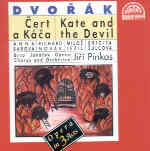This vastly entertaining comic work centers around Kate, a talkative, shrewish woman who is avoided by everyone at the village dance. Angry, she announces that she would dance with the devil himself, and voila!, the Devil Marbuel–not-quite-Lucifer, but a “junior” devil–enters and carries her off to Hell. The clever shepherd Jirka offers to rescue her. In Hell, all the devils sit around playing cards, and Kate and Marbuel enter. She exhausts Lucifer himself with her endless complaining, and when Jirka arrives, he makes a deal with the devils so he can take Kate back–and they’re glad to get rid of her. In mid-bacchanale, Jirka dances Kate out of Hell. Back in the village, the Princess laments how abusive she has been to her people (it turns out that the Devil has had his eye on her), and hearing that Jirka has returned successfully, calls upon him to save her from what she knows will be her fate: going to Hell. If she agrees to abolish serfdom, he says, he’ll save her. She agrees. He returns to the castle with Kate and hides her, and when Marbuel shows up for the Princess and Kate appears, Marbuel runs. All ends happily.
Filled with great tunes, tongue-in-cheek Wagnerian references (the descent into Nibelheim), catchy rhythms, and a sort-of nose-thumbing attitude toward everything, the opera is instantly likeable. This 1979 performance features excellent, colorful performances from the entire cast, who inflect their words conversationally and work as a terrific ensemble. Anna Barova’s Kate is vivid and funny; Brigita Sulcova’s Princess sings her lovely third-act aria beautifully; Milos Jezil’s Jirka is all-knowing, sure of himself, and appealing, and both Richard Novak and Jaroslav Horacek, as Marbuel and Lucifer, sing handsomely and seem to be having a great time–as, I’m certain, will the listener. Highly recommended.
































